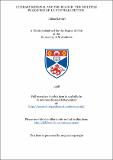Literary renewal and the reader : the multiple pleasures of La nouvelle fiction
Abstract
In this thesis I seek to describe, analyse and characterise the contemporary literary movement La Nouvelle Fiction, a group that has received no critical attention to date. The movement is examined first in terms of its place in French literary history, taking as reference points both literary and theoretical trends: in particular, the nouveau roman and aspects of post-structuralism, with both of which the Nouvelle Fiction implicitly compares or contrasts itself. In Part I, I go on to analyse the theory of the fantastic and detective fiction, both genres that influence the Nouvelle Fiction, and provisional descriptions of the Nouvelle Fiction are thereby developed based on Umberto Eco's theory of the 'model reader'. I suggest that the Nouvelle Fiction demands a particularly active interpretative role of its reader, which is compared in the texts with moral competence in the world. Through analysis of key narrative strategies in Part II (circular narrative structures, unreliable narrative voices, parody, and mise en abyme), the movement is examined for its internal characteristics, and specific differences in practice are established between the Nouvelle Fiction and the nouveau roman. In Part III, aspects of reader-reception are examined, first, through the use of Barthes's anatomy of textual pleasure, second, through the relationship between fiction, the world and identity, and thirdly, through discussion of the extent engagement is possible in these ludic and interpretatively ambiguous texts. I argue that a picture thus emerges of a fiction that heralds a heightened role for the active reader of texts that represent a renewed relationship with reality and with the way narrative shapes it, after the reaction against representation that was an important characteristic of the modernist aesthetic.
Type
Thesis, PhD Doctor of Philosophy
Collections
Items in the St Andrews Research Repository are protected by copyright, with all rights reserved, unless otherwise indicated.

